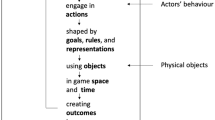Abstract
This paper presents the “Game Theory Explorer” software tool to create and analyze games as models of strategic interaction. A game in extensive or strategic form is created and nicely displayed with a graphical user interface in a web browser. State-of-the-art algorithms then compute all Nash equilibria of the game after a mouseclick. In tutorial fashion, we present how the program is used, and the ideas behind its main algorithms. We report on experiences with the architecture of the software and its development as an open-source project.






















Similar content being viewed by others
Notes
GTE does not show singleton information sets as ovals that contain a single node, only information sets with two or more nodes.
References
Audet C, Belhaiza S, Hansen P (2009) A new sequence form approach for the enumeration of all extreme Nash equilibria for extensive form games. Int Game Theory Rev 11:437–451
Audet C, Hansen P, Jaumard B, Savard G (2001) Enumeration of all extreme equilibria of bimatrix games. SIAM J Sci Comput 23:323–338
Avis D (2000) Lrs: a revised implementation of the reverse search vertex enumeration algorithm. In: Kalai G, Ziegler G (eds) Polytopes-combinatorics and computation. DMV Seminar Band 29. Birkhäuser, Basel, pp 177–198
Avis D (2006) User’s guide for lrs. http://cgm.cs.mcgill.ca/~avis. Accessed 2 April 2014
Avis D, Rosenberg G, Savani R, von Stengel B (2010) Enumeration of Nash equilibria for two-player games. Econ Theory 42:9–37
Bagwell K (1995) Commitment and observability in games. Games Econ Behav 8:271–280
Balthasar AV (2009) Geometry and equilibria in bimatrix games. PhD Thesis, London School of Economics, London
Barnes N (2010) Publish your computer code: it is good enough. Nature 467:753–753
Belhaiza SJ, Mve AD, Audet C (2010) XGame-solver software. http://faculty.kfupm.edu.sa/MATH/slimb/XGame-Solver-Webpage/index.htm. Accessed 2 April 2014
Bron C, Kerbosch J (1973) Finding all cliques of an undirected graph. Commun ACM 16:575–577
Conitzer V, Sandholm T (2008) New complexity results about Nash equilibria. Games Econ Behav 63:621–641
Datta RS (2010) Finding all Nash equilibria of a finite game using polynomial algebra. Econ Theory 42:55–96
Gilboa I, Zemel E (1989) Nash and correlated equilibria: some complexity considerations. Games Econ Behav 1:80–93
Govindan S, Wilson R (2004) Computing Nash equilibria by iterated polymatrix approximation. J Econ Dyn Control 28:1229–1241
Harsanyi JC, Selten R (1988) A general theory of equilibrium selection in games. MIT Press, Cambridge
Hauk E, Hurkens S (2002) On forward induction and evolutionary and strategic stability. J Econ Theory 106:66–90
Huang W (2011) Equilibrium computation for extensive games. PhD Thesis, London School of Economics, London
Jiang AX, Leyton-Brown K, Bhat NAR (2011) Action-graph games. Games Econ Behav 71:141–173
Kohlberg E, Mertens J-F (1986) On the strategic stability of equilibria. Econometrica 54:1003–1037
Kuhn HW (1953) Extensive games and the problem of information. Contributions to the theory of games II. In: Kuhn HW, Tucker AW (eds) Annals of mathematics studies, 28th edn. Princeton University Press, Princeton, pp 193–216
Langlois J-P (2006) GamePlan, a windows application for representing and solving games. http://userwww.sfsu.edu/langlois/. Accessed 2 April 2014
Lemke CE (1965) Bimatrix equilibrium points and mathematical programming. Manag Sci 11:681–689
Lemke CE, Howson JT Jr (1964) Equilibrium points of bimatrix games. J Soc Ind Appl Math 12:413–423
McKelvey RD, McLennan AM, Turocy TL (2010) Gambit: software tools for game theory, version 0.2010.09.01. http://www.gambit-project.org. Accessed 2 April 2014
Nash J (1951) Noncooperative games. Ann Math 54:286–295
Osborne MJ (2004) An introduction to game theory. Oxford University Press, Oxford
Quint T, Shubik M (1997) A theorem on the number of Nash equilibria in a bimatrix game. Int J Game Theory 26:353–359
Savani R (2005) Solve a bimatrix game. Interactive website. http://banach.lse.ac.uk/. Accessed 2 April 2014
Savani R, von Stengel B (2004) Exponentially many steps for finding a Nash equilibrium in a bimatrix game. In: CDAM research report LSE-CDAM-2004-03
Savani R, von Stengel B (2006) Hard-to-solve bimatrix games. Econometrica 74:397–429
Shapley LS (1974) A note on the Lemke–Howson algorithm. In: Mathematical programming study 1: pivoting and extensions, pp 175–189
van der Laan G, Talman AJJ, van der Heyden L (1987) Simplicial variable dimension algorithms for solving the nonlinear complementarity problem on a product of unit simplices using a general labelling. Math Oper Res 12:377–397
von Stengel B (1996) Efficient computation of behavior strategies. Games Econ Behav 14:220–246
von Stengel B (1999) New maximal numbers of equilibria in bimatrix games. Discret Comput Geom 21:557–568
von Stengel B (2002) Computing equilibria for two-person games. In: Aumann RJ, Hart S (eds) Handbook of game theory, vol 3. North-Holland, Amsterdam, pp 1723–1759
von Stengel B et al (2007) Equilibrium computation for two-player games in strategic and extensive form. In: Nisan N (ed) Algorithmic game theory. Cambridge University Press, Cambridge, pp 53–78
von Stengel B (2012) Rank-1 games with exponentially many Nash equilibria. Preprint. arXiv:1211.2405
von Stengel B, van den Elzen AH, Talman AJJ (2002) Computing normal form perfect equilibria for extensive two-person games. Econometrica 70:693–715
Acknowledgments
We are indebted to Mark Egesdal, Alfonso Gómez-Jordana and Martin Prause for their invaluable contributions as programmers of GTE. Mark Egesdal designed the main program structure and coined the name “Game Theory Explorer”, with financial support from a STICERD research grant at the London School of Economics in 2010. Alfonso Gómez-Jordana and Martin Prause were funded by the Google Summer of Code in 2011 and 2012 for the open-source Gambit project, and continue as contributing volunteers. Karen Bletzer wrote conversion programs between GTE and Gambit file formats. Wan Huang implemented the enumeration of Nash equilibria based on the sequence form. We thank Theodore L. Turocy for inspiring discussions and for his support of GTE as part of Gambit. David Avis has written the lrsNash code for computing all Nash equilibria of a two-player game. All contributions and financial support are gratefully acknowledged.
Author information
Authors and Affiliations
Corresponding author
Rights and permissions
About this article
Cite this article
Savani, R., von Stengel, B. Game Theory Explorer: software for the applied game theorist. Comput Manag Sci 12, 5–33 (2015). https://doi.org/10.1007/s10287-014-0206-x
Received:
Accepted:
Published:
Issue Date:
DOI: https://doi.org/10.1007/s10287-014-0206-x




